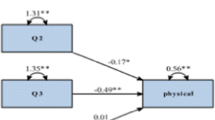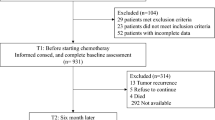Abstract
Purpose
The objective of this article was to evaluate the psychometric properties of the translated Lebanese Arabic version of the European Organization for Research and Treatment of Cancer Quality of Life Questionnaire-C30 in a sample of adult cancer patients in Lebanon.
Methods
The EORTC QLQ-C30 was translated into Lebanese Arabic and administered to a convenient sample of 200 adult patients diagnosed with cancer at a tertiary care center in Lebanon between 2009 and 2010. The psychometric indices assessed were reliability, multitrait scaling analysis, construct validity, and confirmatory factor analysis.
Results
Six out of nine subscales had Cronbach’s alpha coefficients above 0.70. Multitrait scaling analysis showed that all item-scale correlation coefficients met the set standards of convergent validity with the exception of item 5 only (95.8 %). In addition, 79.7 % of the item-scale correlation coefficients met the criterion for discriminant validity. In inter-scale correlations, all conceptually related scales had correlation coefficients of ≥0.40 with the exception of role functioning and fatigue scales having an undesirable correlation coefficient of −0.76. In known-groups comparison, the instrument differentiated significantly between some of the subscales with respect to education, employment, and age. CFA showed an almost good fit (GFI = 0.87) with respect to our current data set.
Conclusion
The translated Lebanese Arabic version of the EORTC QLQ-C30 is a reliable and valid instrument that can be used to assess the quality of life of Lebanese cancer patients.
Similar content being viewed by others
References
Guzelant, A., Goksel, T., Ozkok, S., Tasbakan, S., Aysant, T., & Bottomley, A. (2004). The European organization for research and treatment of cancer QLQ-C30: An examination into the cultural validity and reliability of the Turkish version of the EORTC QLQ-C30. European Journal of Cancer Care, 13, 135–144.
Palmer, J. L., & Fisch, M. J. (2005). Association between symptom distress and survival in outpatients seen in a palliative care cancer center. Journal of Pain and Symptom Management, 29(6), 565–571.
Minasian, L. M., O’Mara, A. M., Reeve, B. B., Denicoff, A. M., Kelaghan, J., Rowland, J. H., et al. (2007). Health-related quality of life and symptom management research sponsored by the National Cancer Institute. Journal of Clinical Oncology, 25, 5128–5132.
Perwitasari, D. A., Atthobari, J., Dwiprahasto, I., Hakimi, M., Gelderblom, H., Putter, H., et al. (2011). Translation and validation of EORTC QLQ-C30 into Indonesian version for cancer patients in Indonesia. Japanese Journal of Clinical Oncology, 41(4), 519–529.
Lehto, U. S., Ojanen, M., & Kellokumpu-Lehtinen, P. (2005). Predictors of quality of life in newly diagnosed melanoma and breast cancer patients. Annals of Oncology, 16, 805–816.
Pal Singh, D. (2010). Quality of life in cancer patients receiving palliative care. Indian Journal of Palliative Care, 16(1), 36–43.
Buccheri, G., Ferrigno, D., & Tamburini, M. (1996). Karnofsky and ECOG performance status scoring in lung cancer: A prospective, longitudinal study of 536 patients from a single institution. European Journal of Cancer, 32A(7), 1135–1141.
Aaronson, N. K., Ahmedzai, S., Bergman, B., Bullinger, M., Cull, A., Duez, N. J., et al. (1993). The European organization for research and treatment of cancer QLQ-C30: A quality-of-life instrument for use in international clinical trials in oncology. Journal of the National Cancer Institute, 85(5), 365–376.
Koller, M., Aaronson, N. K., Blazeby, J., Bottomley, A., Dewolf, L., Fayers, P., et al. (2007). Translation procedures for standardised quality of life questionnaires: The European organization for research and treatment of cancer (EORTC) approach. European Journal of Cancer, 43, 1810–1820.
Bjordal, K., de Graeff, A., Fayers, P. M., Hammerlid, E., van Pottelsberghe, C., Curran, D., et al. (2000). A 12 country field study of the EORTC QLQ-C30 (version 3.0) and the head and neck cancer specific module (EORTC QLQ-H&N35) in head and neck patients. EORTC quality of life group. European Journal of Cancer, 36, 1796–1807.
Hoopman, R., Muller, M. J., Terwee, C. B., & Aaronson, N. K. (2006). Translation and validation of the EORTC QLQ-C30 for use among Turkish and Moroccan ethnic minority cancer patients in the Netherlands. European Journal of Cancer, 42, 1839–1847.
Awad, M. A., Denic, S., & El-Hakam, T. (2008). Validation of the European organization for research and treatment of cancer quality of life questionnaires for Arabic-speaking populations. Annals of the New York Academy of Sciences, 1138, 146–154.
Alawadhi, S. A., & Ohaeri, J. U. (2010). Validity and reliability of the European organization for research and treatment in cancer quality of life questionnaire (EORTC QLQ): Experience from Kuwait using a sample of women with breast cancer. Annals of Saudi Medicine, 30(5), 390–396.
Abu-Saad Huijer, H., Abboud, S. & Doumit, M. (2012). Symptom prevalence and management of cancer patients in Lebanon. Journal of Pain and Symptom Management. (in Press).
Abu-Saad Huijer, H., Doumit, M. Abboud, S., & Dimassi, H. (2012). Quality of palliative care; perspectives of Lebanese patients with cancer. Lebanese Medical Journal, 60(2). (in Press).
Fayers, P. M., Aaronson, N. K., Bjordal, K., Groenvold, M., Curran, D., & Bottomley, A. (2001). On behalf of the EORTC quality of life group. EORTC QLQ-C30 Scoring Manual (3rd ed.). Brussels: EORTC.
Varricchio, C. G. (2004). Measurements issues concerning linguistic translations. In M. Frank-Stromborg & J. Olsen (Eds.), Instruments for clinical health-care research (pp. 56–64). Boston: Jones and Barlett.
Nunnally, J. C., & Bernstein, I. H. (1994). Psychometric theory (3rd ed.). New York: McGraw-Hill.
Hays, R. D., & Hayashi, T. (1990). Beyond internal consistency reliability: Rationale and user’s guide for multitrait analysis program on the microcomputer. Behavior Research Methods, Instruments, Computers, 22, 167–175.
Marsh, H. W., Balla, J. R., & Hau, K. T. (1996). An evaluation of incremental fit indices: A clarification of mathematical and empirical properties. In G. A. Marcoulides & R. E. Schumacker (Eds.), Advanced structural equation modelling: Issues and techniques (pp. 315–535). London, NJ: Erlbaum Publishers.
Hu, L., & Bentler, P. M. (1999). Cutoff criteria for fit indexes in covariance structure analysis: conventional criteria versus new alternatives. Structural Equation Modeling, 6(1), 1–55.
Schwarz, R., & Hinz, A. (2001). Reference data for the quality of life questionnaire EORTC QLQ-C30 in the general German population. European Journal of Cancer, 37, 1345–1351.
Montazeri, A., Harirchi, I., Vahdani, M., Khaleghi, F., Jarvandi, S., Ebrahimi, M., et al. (1999). The European organization for research and treatment of cancer quality of life questionnaire (EORTC QLQ-C30): Translation and validation study of the Iranian version. Supportive Care in Cancer, 7, 400–406.
Sherman, A. C., Simonton, S., Adams, A. C., Vural, E., Qwens, B., & Hanna, E. (2000). Assessing quality of life in patients with head and neck cancer. Archives of Otolaryngology- Head & Neck Surgery, 126, 459–467.
Luo, N., Fones, C. S. L., Lim, S. E., Xie, F., Thumboo, J., & Li, S. C. (2005). The european organization for research and treatment of cancer quality of life questionnaire (EORTC QLQ-C30): Validation of English version in Singapore. Quality of Life Research, 14, 1181–1186.
Zhao, H., & Kanda, K. (2004). Testing psychometric properties of the standard Chinese version of the European organization for research and treatment of cancer quality of life core questionnaire 30 (EORTC QLQ-C30). Journal of Epidemiology, 14, 193–203.
Kobayashi, K., Takeda, F., Teramukai, S., Gotoh, I., Sakai, H., Yoneda, S., et al. (1998). A cross-validation of the European organization for research and treatment of cancer QLQ-C30 (EORTC QLQ-C30) for Japanese with lung cancer. European Journal of Cancer, 34(6), 810–815.
Kontodimopoulos, N., Ntinoulis, K., & Niakas, D. (2011). Validity of the Greek EORTC QLQ-C30 and QLQ-BR23 for measuring health-related quality of life in breast cancer patients. European Journal of Cancer Care, 20, 354–361.
Cankurtaran, E. S., Ozalp, E., Soygur, H., Ozer, S., Akbiyik, D. I., & Bottomley, A. (2008). Understanding the reliability and validity of the EORTC QLQ-C30 in Turkish cancer patients. European Journal of Cancer Care, 17, 98–104.
Michelson, H., Bolund, C., Nilsson, B., & Brandberg, Y. (2000). Health-related quality of life measured by the EORTC QLQ-C30: Reference values from a large sample of the Swedish population. Acta Oncologica, 39(4), 477–484.
Acknowledgments
The authors wish to express their gratitude to the EORTC Study Group on Quality of Life for their permission to translate the QLQ-C30 questionnaire into Arabic. Funding to conduct this study was provided by LNCRS (Lebanese National Council for Scientific Research).
Author information
Authors and Affiliations
Corresponding author
Rights and permissions
About this article
Cite this article
Huijer, H.AS., Sagherian, K. & Tamim, H. Validation of the Arabic version of the EORTC quality of life questionnaire among cancer patients in Lebanon. Qual Life Res 22, 1473–1481 (2013). https://doi.org/10.1007/s11136-012-0261-0
Accepted:
Published:
Issue Date:
DOI: https://doi.org/10.1007/s11136-012-0261-0




